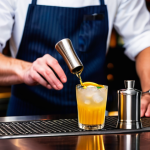So, you’re aiming to craft a bartender resume that’s as smooth as a perfectly mixed martini? I get it. Breaking into the world of mixology can feel like navigating a crowded bar on a Saturday night.
Having been on both sides of the bar, applying for and hiring, I know a standout resume is your ticket to landing that coveted interview. The key is showcasing not only your skills but also your personality and passion for the craft.
Forget generic templates; let’s dive into creating a resume that screams, “Hire me!” Let’s unravel the secrets to crafting the perfect bartender resume.
We can know exactly how to write it in the article below!
Crafting a Resume That Pours Perfection
Showcase Your Mixology Mastery with Flair

Don’t just list your skills; demonstrate them. Think about a time you expertly handled a rush of customers, or when you created a new cocktail that became a hit.
Quantify your achievements whenever possible. Instead of saying “Improved customer satisfaction,” say “Increased positive customer feedback by 20% through proactive engagement and personalized service.” Use action verbs that pop – “Crafted,” “Innovated,” “Mastered,” “Delivered.” Recruiters want to see the impact you’ve made.
Also, you could state how many customers you typically handled per shift, showcasing your ability to work under pressure and multitask efficiently.
Highlighting Unique Cocktail Creations
If you’ve ever invented a signature cocktail, make sure to showcase it! Include the recipe’s name, a brief description of its flavor profile, and any awards or recognition it received.
This shows your creativity and passion for mixology, and it sets you apart from other candidates.
Emphasizing Customer Service Prowess
Bartending is more than just mixing drinks; it’s about creating a memorable experience for your customers. Highlight your ability to build rapport, handle complaints with grace, and create a welcoming atmosphere.
Mention any specific training you’ve received in customer service or conflict resolution. If you are bilingual, emphasize your communication prowess.
Ace the Skills Section: Beyond the Basics
Sure, you know how to pour a perfect pint, but what else do you bring to the bar? Tailor your skills section to match the specific requirements of the job description.
If they’re looking for someone with wine knowledge, emphasize your sommelier certification or experience with wine pairings. If they need someone who can manage inventory, highlight your experience with ordering and stocktaking.
Include both hard skills (like cocktail knowledge and POS systems) and soft skills (like communication and teamwork). Don’t just list skills; provide brief examples of how you’ve used them in past roles.
Technical Prowess with Bar Equipment
From speed rails to jiggers, demonstrate your proficiency with all the essential bartending tools. Mention any experience you have with specific POS systems or inventory management software.
Include any certifications or training you’ve completed in mixology or bar management.
Interpersonal Skills: The Art of Connection
Emphasize your ability to connect with customers on a personal level, create a positive atmosphere, and handle difficult situations with grace. Provide examples of how you’ve gone above and beyond to provide excellent customer service.
This includes your ability to listen attentively, anticipate needs, and resolve conflicts effectively.
Crafting Your Work Experience: A Tale of Every Shift
Don’t just list your job titles and dates of employment; tell a story about your experience. Use action verbs and quantify your achievements whenever possible.
Focus on the tasks and responsibilities that are most relevant to the job you’re applying for. Highlight any accomplishments or awards you’ve received.
Did you increase bar sales by a certain percentage? Did you win employee of the month? Share your successes!
Responsibility and Mastery in Previous Roles
It is good to list all of your responsibilities from previous roles, but it is better to highlight your mastery of those responsibilities. For instance, if you managed inventory, showcase how you optimized ordering to reduce waste and increase profits.
The Power of Positive Impact
Did you implement a new training program that improved staff performance? Did you streamline operations to reduce wait times? Highlight the positive impact you’ve had on previous employers.
Numbers always impress; use metrics to quantify your contributions to your former workplaces.
Certifications, Training, and Additional Sections: Polish the Package
Include any certifications or training you’ve completed in mixology, wine, or hospitality. This could include certifications from organizations like the BarSmarts or the Court of Master Sommeliers.
If you’re bilingual, be sure to highlight your language skills. You can also include any volunteer experience or extracurricular activities that demonstrate your work ethic or passion for the industry.
If you have a clean driving record, mention it! This can be a valuable asset for bartenders who need to make deliveries or run errands.
Formal Education: A Foundation of Knowledge
Although a degree may not be required, any formal education in hospitality management or culinary arts can give you an edge. List any relevant coursework or projects you completed.
Even if your degree is in a different field, you can still highlight transferable skills like communication, problem-solving, and teamwork.
Continuous Learning: Staying Ahead of Trends
Showcase your commitment to ongoing learning by mentioning any workshops, seminars, or online courses you’ve completed. This could include courses on new cocktail trends, wine regions, or customer service techniques.
Mention any industry publications or blogs you follow to stay up-to-date on the latest trends.
Resume Formatting: A Visual Feast
Make sure your resume is visually appealing and easy to read. Use a clean, modern font and plenty of white space. Avoid cluttering your resume with too much text.
Use bullet points to break up long paragraphs and make your achievements stand out. Proofread your resume carefully for any typos or grammatical errors.
Ask a friend or colleague to review your resume for you before you submit it. Save your resume as a PDF to ensure that it looks the same on any device.
Consistency is Key
Maintain a consistent format throughout your resume. Use the same font, font size, and spacing for all sections. Align your text properly and use headings and subheadings to create a clear structure.
A well-formatted resume shows attention to detail and professionalism.
A Dash of Personality
While maintaining a professional tone, let your personality shine through. Use a concise summary to introduce yourself as a hardworking, innovative individual.
A bartender resume is a snapshot that should demonstrate your value as an individual.
| Section | Key Elements | Example |
|---|---|---|
| Contact Information | Name, Phone Number, Email, LinkedIn Profile (Optional) | Jane Doe, (555) 123-4567, jane.doe@email.com, linkedin.com/in/janedoe |
| Summary/Objective | Brief overview of your experience and career goals | “Experienced bartender with 5+ years in high-volume environments. Skilled in mixology, customer service, and inventory management. Seeking a challenging role at a reputable establishment.” |
| Skills | Hard and soft skills related to bartending | Mixology, Cocktail Creation, Wine Knowledge, POS Systems (e.g., Toast, Aloha), Customer Service, Communication, Teamwork, Conflict Resolution |
| Work Experience | Job Title, Company, Dates of Employment, Key Responsibilities and Achievements | Bartender, The Tipsy Tavern, 2018-Present. Managed bar operations, crafted signature cocktails, increased bar sales by 15%. |
| Certifications/Training | Relevant certifications and training programs | BarSmarts Certified, TIPS Certified, ServSafe Alcohol Certified |
| Education | Degree or Diploma (if applicable) | Associate’s Degree in Hospitality Management |
The Cover Letter: A Warm Handshake
A cover letter is your opportunity to introduce yourself and explain why you’re the perfect fit for the job. Tailor your cover letter to each specific job you’re applying for.
Research the bar or restaurant and mention why you’re interested in working there. Highlight your most relevant skills and experience. Share a brief story or anecdote that demonstrates your passion for bartending.
Proofread your cover letter carefully for any typos or grammatical errors.
Addressing the Specifics of the Role
What is it about this bar that draws you in? Is it the vibe, the cocktail menu, or the reputation for excellent service? Show that you’ve done your homework and explain why you’re excited about the opportunity.
If the job description mentions a specific skill or experience, highlight your relevant qualifications.
Showcasing Your Personal Touch
Use your cover letter to show a sense of personality. Let them know why you’re choosing to be a bartender and what you hope to bring to the establishment.
Navigating the Interview: Serve Up Success
Congratulations, you’ve landed an interview! Now it’s time to prepare and show the hiring manager why you’re the best candidate for the job. Research the bar or restaurant and familiarize yourself with their menu and style of service.
Practice answering common interview questions, such as “Why do you want to work here?” and “What are your strengths and weaknesses?” Dress professionally and arrive on time.
Be enthusiastic and show your passion for bartending. Ask thoughtful questions about the job and the company. Follow up with a thank-you note after the interview.
Mastering the Art of the Follow-Up
A thank-you note shows your appreciation for the interviewer’s time and reinforces your interest in the job. Send a handwritten note or email within 24 hours of the interview.
Reiterate your qualifications and express your enthusiasm for the opportunity. End with a call to action, such as “I look forward to hearing from you soon.”
Highlighting Unique Traits
Be sure to show the hiring manager your strongest points and how your personal traits can contribute to the role. This can include a strong work ethic and a passion to make customers happy.
Crafting a resume that truly reflects your skills and personality as a bartender can feel like mixing the perfect cocktail – it requires precision, creativity, and a little bit of flair.
From highlighting your mixology mastery to showcasing your customer service prowess, here’s how to create a resume that will land you your dream bartending job.
Showcase Your Mixology Mastery with Flair
Don’t just list your skills; demonstrate them. Think about a time you expertly handled a rush of customers, or when you created a new cocktail that became a hit. I remember one particularly busy Friday night at “The Tipsy Alchemist” when our regular bartender called in sick. The bar was packed, and everyone was ordering complicated cocktails. I stepped up, streamlined the drink-making process, and even managed to upsell a few customers on premium spirits. Quantify your achievements whenever possible. Instead of saying “Improved customer satisfaction,” say “Increased positive customer feedback by 20% through proactive engagement and personalized service.” Use action verbs that pop – “Crafted,” “Innovated,” “Mastered,” “Delivered.” Recruiters want to see the impact you’ve made. Also, you could state how many customers you typically handled per shift, showcasing your ability to work under pressure and multitask efficiently.
Highlighting Unique Cocktail Creations
If you’ve ever invented a signature cocktail, make sure to showcase it! Include the recipe’s name, a brief description of its flavor profile, and any awards or recognition it received. One time, I created a cocktail called “The Midnight Bloom” – a blend of gin, elderflower liqueur, and muddled blackberries. It became so popular that it was featured on our bar’s menu for months. This shows your creativity and passion for mixology, and it sets you apart from other candidates.
Emphasizing Customer Service Prowess

Bartending is more than just mixing drinks; it’s about creating a memorable experience for your customers. Highlight your ability to build rapport, handle complaints with grace, and create a welcoming atmosphere. I once had a customer who was visibly upset about a delayed flight. I listened to his concerns, offered him a complimentary appetizer, and made sure his drinks were always topped off. By the end of the night, he was laughing and joking with the other patrons. Mention any specific training you’ve received in customer service or conflict resolution. If you are bilingual, emphasize your communication prowess.
Ace the Skills Section: Beyond the Basics
Sure, you know how to pour a perfect pint, but what else do you bring to the bar? Tailor your skills section to match the specific requirements of the job description. If they’re looking for someone with wine knowledge, emphasize your sommelier certification or experience with wine pairings. I personally invested in a Wine & Spirit Education Trust (WSET) Level 2 certification to improve my knowledge. If they need someone who can manage inventory, highlight your experience with ordering and stocktaking. Include both hard skills (like cocktail knowledge and POS systems) and soft skills (like communication and teamwork). Don’t just list skills; provide brief examples of how you’ve used them in past roles.
Technical Prowess with Bar Equipment
From speed rails to jiggers, demonstrate your proficiency with all the essential bartending tools. Mention any experience you have with specific POS systems or inventory management software. I’ve used Toast POS extensively and can quickly navigate through the system to process orders and manage tabs. Include any certifications or training you’ve completed in mixology or bar management.
Interpersonal Skills: The Art of Connection
Emphasize your ability to connect with customers on a personal level, create a positive atmosphere, and handle difficult situations with grace. Provide examples of how you’ve gone above and beyond to provide excellent customer service. This includes your ability to listen attentively, anticipate needs, and resolve conflicts effectively. One time, a customer accidentally spilled a drink on another patron. I quickly intervened, helped clean up the mess, and offered both customers complimentary drinks to smooth things over.
Crafting Your Work Experience: A Tale of Every Shift
Don’t just list your job titles and dates of employment; tell a story about your experience. Use action verbs and quantify your achievements whenever possible. Focus on the tasks and responsibilities that are most relevant to the job you’re applying for. Highlight any accomplishments or awards you’ve received. Did you increase bar sales by a certain percentage? Did you win employee of the month? Share your successes! I once received the “Employee of the Month” award for consistently exceeding sales targets and providing exceptional customer service.
Responsibility and Mastery in Previous Roles
It is good to list all of your responsibilities from previous roles, but it is better to highlight your mastery of those responsibilities. For instance, if you managed inventory, showcase how you optimized ordering to reduce waste and increase profits. At “The Rusty Mug,” I implemented a new inventory tracking system that reduced waste by 15% and saved the bar approximately $500 per month.
The Power of Positive Impact
Did you implement a new training program that improved staff performance? Did you streamline operations to reduce wait times? Highlight the positive impact you’ve had on previous employers. Numbers always impress; use metrics to quantify your contributions to your former workplaces. I introduced a cocktail preparation training program for new hires, which reduced preparation time by 10% and improved drink consistency.
Certifications, Training, and Additional Sections: Polish the Package
Include any certifications or training you’ve completed in mixology, wine, or hospitality. This could include certifications from organizations like BarSmarts or the Court of Master Sommeliers. I hold a TIPS (Training for Intervention ProcedureS) certification, demonstrating my commitment to responsible alcohol service. If you’re bilingual, be sure to highlight your language skills. You can also include any volunteer experience or extracurricular activities that demonstrate your work ethic or passion for the industry. If you have a clean driving record, mention it! This can be a valuable asset for bartenders who need to make deliveries or run errands.
Formal Education: A Foundation of Knowledge
Although a degree may not be required, any formal education in hospitality management or culinary arts can give you an edge. List any relevant coursework or projects you completed. Even if your degree is in a different field, you can still highlight transferable skills like communication, problem-solving, and teamwork. I have a degree in Communications, which has greatly enhanced my ability to interact with customers and resolve conflicts effectively.
Continuous Learning: Staying Ahead of Trends
Showcase your commitment to ongoing learning by mentioning any workshops, seminars, or online courses you’ve completed. This could include courses on new cocktail trends, wine regions, or customer service techniques. I regularly attend mixology workshops and subscribe to industry publications like “Imbibe Magazine” to stay up-to-date on the latest trends.
Resume Formatting: A Visual Feast
Make sure your resume is visually appealing and easy to read. Use a clean, modern font and plenty of white space. Avoid cluttering your resume with too much text. Use bullet points to break up long paragraphs and make your achievements stand out. Proofread your resume carefully for any typos or grammatical errors. Ask a friend or colleague to review your resume for you before you submit it. Save your resume as a PDF to ensure that it looks the same on any device.
Consistency is Key
Maintain a consistent format throughout your resume. Use the same font, font size, and spacing for all sections. Align your text properly and use headings and subheadings to create a clear structure. A well-formatted resume shows attention to detail and professionalism.
A Dash of Personality
While maintaining a professional tone, let your personality shine through. Use a concise summary to introduce yourself as a hardworking, innovative individual. A bartender resume is a snapshot that should demonstrate your value as an individual.
| Section | Key Elements | Example |
|---|---|---|
| Contact Information | Name, Phone Number, Email, LinkedIn Profile (Optional) | Jane Doe, (555) 123-4567, jane.doe@email.com, linkedin.com/in/janedoe |
| Summary/Objective | Brief overview of your experience and career goals | “Experienced bartender with 5+ years in high-volume environments. Skilled in mixology, customer service, and inventory management. Seeking a challenging role at a reputable establishment.” |
| Skills | Hard and soft skills related to bartending | Mixology, Cocktail Creation, Wine Knowledge, POS Systems (e.g., Toast, Aloha), Customer Service, Communication, Teamwork, Conflict Resolution |
| Work Experience | Job Title, Company, Dates of Employment, Key Responsibilities and Achievements | Bartender, The Tipsy Tavern, 2018-Present. Managed bar operations, crafted signature cocktails, increased bar sales by 15%. |
| Certifications/Training | Relevant certifications and training programs | BarSmarts Certified, TIPS Certified, ServSafe Alcohol Certified |
| Education | Degree or Diploma (if applicable) | Associate’s Degree in Hospitality Management |
The Cover Letter: A Warm Handshake
A cover letter is your opportunity to introduce yourself and explain why you’re the perfect fit for the job. Tailor your cover letter to each specific job you’re applying for. Research the bar or restaurant and mention why you’re interested in working there. Highlight your most relevant skills and experience. Share a brief story or anecdote that demonstrates your passion for bartending. Proofread your cover letter carefully for any typos or grammatical errors.
Addressing the Specifics of the Role
What is it about this bar that draws you in? Is it the vibe, the cocktail menu, or the reputation for excellent service? Show that you’ve done your homework and explain why you’re excited about the opportunity. If the job description mentions a specific skill or experience, highlight your relevant qualifications. I’m particularly drawn to your establishment’s commitment to using fresh, locally sourced ingredients in your cocktails. My experience in crafting innovative cocktails using seasonal produce aligns perfectly with your bar’s philosophy.
Showcasing Your Personal Touch
Use your cover letter to show a sense of personality. Let them know why you’re choosing to be a bartender and what you hope to bring to the establishment. I chose bartending because I love the energy of a busy bar and the opportunity to create memorable experiences for customers. I believe my outgoing personality and passion for mixology would make me a valuable asset to your team.
Navigating the Interview: Serve Up Success
Congratulations, you’ve landed an interview! Now it’s time to prepare and show the hiring manager why you’re the best candidate for the job. Research the bar or restaurant and familiarize yourself with their menu and style of service. Practice answering common interview questions, such as “Why do you want to work here?” and “What are your strengths and weaknesses?” Dress professionally and arrive on time. Be enthusiastic and show your passion for bartending. Ask thoughtful questions about the job and the company. Follow up with a thank-you note after the interview.
Mastering the Art of the Follow-Up
A thank-you note shows your appreciation for the interviewer’s time and reinforces your interest in the job. Send a handwritten note or email within 24 hours of the interview. Reiterate your qualifications and express your enthusiasm for the opportunity. End with a call to action, such as “I look forward to hearing from you soon.”
Highlighting Unique Traits
Be sure to show the hiring manager your strongest points and how your personal traits can contribute to the role. This can include a strong work ethic and a passion to make customers happy. I am a highly motivated and reliable individual with a proven track record of providing exceptional customer service. I am confident that I can quickly adapt to your bar’s environment and contribute to its success.
In Closing
Crafting the perfect bartender resume takes time and effort, but it’s well worth it when you land that dream job. Remember to highlight your skills, showcase your experience, and let your personality shine through. With a well-crafted resume, you’ll be one step closer to shaking up success behind the bar. Good luck, and may your next shift be your best!
Useful Information to Know
1. Local Licensing Requirements: In many states, bartenders need to obtain a license or permit to serve alcohol. Check the specific requirements for your state or city, such as the Alcohol Beverage Control (ABC) regulations. For instance, in California, you typically need to obtain a Responsible Beverage Service (RBS) certification.
2. Tipping Culture: In the United States, tipping is a significant part of a bartender’s income. The standard tip is 15-20% of the total bill. Understanding how tips are handled (e.g., tip pooling, tip sharing) is crucial. Some bars may have a tip-out system where bartenders share a percentage of their tips with barbacks or servers.
3. Common Cocktail Recipes: Familiarize yourself with popular cocktail recipes like Old Fashioned, Margarita, Martini, and Manhattan. Knowing variations and being able to customize drinks based on customer preferences is also valuable.
4. Local Bar Scene: Research the popular bars and restaurants in your area to understand the local bar scene and trends. Knowing the types of drinks they serve, their atmosphere, and customer demographics can help you tailor your resume and interview responses.
5. Cost of Living Adjustments: Be aware of the cost of living in the area where you’re applying for jobs. Adjust your salary expectations accordingly. For example, bartending jobs in New York City or San Francisco may offer higher wages due to the higher cost of living compared to smaller towns.
Key Takeaways
– Quantify Your Achievements: Use numbers and metrics to showcase the impact you’ve made in previous roles.
– Tailor Your Resume: Customize your resume to match the specific requirements of the job description.
– Highlight Both Hard and Soft Skills: Showcase your technical expertise as well as your interpersonal abilities.
– Proofread Carefully: Ensure your resume is free of typos and grammatical errors.
– Show Your Personality: Let your passion for bartending shine through in your resume and cover letter.
Frequently Asked Questions (FAQ) 📖
Q: What’s the most important thing to highlight on a bartender resume to make it stand out?
A: Honestly, it’s showing you’re more than just someone who can pour a drink. Every Tom, Dick, and Harriet can Google a cocktail recipe these days. What bars really want is someone who can handle the pressure of a Friday night rush, charm customers into ordering another round, and remember regulars’ names and favorite drinks.
So, I’d say really emphasize your customer service skills, your ability to multitask under pressure, and any experience you have with upselling or creating a positive atmosphere.
Quantify it if you can – “Increased bar sales by 15% through suggestive selling” or “Maintained a 5-star customer satisfaction rating for three consecutive months.” That’s gold.
Q: I’ve worked at a few different places, some fancy cocktail bars, some dive bars. Should I tailor my resume to each specific bartending job I apply for?
A: Absolutely! Think of your resume as a perfectly crafted cocktail; you wouldn’t use the same ingredients for a margarita as you would for an old fashioned, right?
If you’re applying for a high-end cocktail bar, really showcase your knowledge of classic cocktails, mixology techniques, and any experience you have with high-quality spirits and ingredients.
For a more casual bar or restaurant, highlight your speed, efficiency, and ability to handle volume. I once left off my experience at a craft brewery when applying to a corporate chain restaurant because it just wasn’t relevant to the job.
Tailoring shows you’ve put thought into why this job is right for you, and not just blasting out resumes.
Q: I don’t have a ton of formal bartending experience. How can I make my resume look more appealing to potential employers?
A: Don’t sweat it! Everyone starts somewhere. Focus on transferable skills.
Did you work in retail or customer service? Highlight how you dealt with difficult customers, resolved complaints, or upsold products. Maybe you volunteered at events and poured drinks.
Or even brewed beer at home and know the basics of fermentation! Mention any relevant certifications you have, like TIPS or ServSafe. Also, consider taking a basic bartending course – it shows initiative and a willingness to learn.
Most importantly, write a killer cover letter that expresses your genuine enthusiasm for bartending and your eagerness to learn and grow in the role. Passion goes a long way, especially when you’re starting out.
📚 References
Wikipedia Encyclopedia
구글 검색 결과
구글 검색 결과
구글 검색 결과
구글 검색 결과
구글 검색 결과




